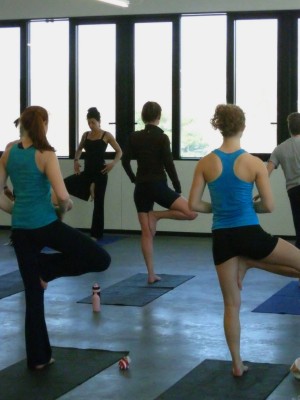One of my favorite books is Don Miguel Ruiz’s book, “The Four Agreements.†One of the Four Agreements or what he refers to as the “essential steps for personal freedom†is “Don’t take things personally.†As a yoga teacher, there are lots of opportunities to take things personally. People come to your class or they don’t. Isn’t that about you? The point is, who knows. Maybe. Maybe not.
When we take things personally as a yoga teacher, it burdens us with the weight of things over which we have little control. We’re not off the hook completely though; it is our job to do our best (another one of the agreements) and use all information we get as a way to grow as a teacher if we truly believe it applies to us. But it is not our job to beat ourselves up for things that may be impacted by conditions outside of our control.
One of the funniest things about not taking things personally, in my mind, is that we often think of the tenet as applying to uncomfortable or unpleasant things. But the challenge is to avoid taking things personally even when they are pleasant and complimentary. It’s like the Taoist story of an old farmer who lost his horse and his neighbors say, “Sorry for your bad luck,†and he says, “Maybe.†The horse returns with more horses and they then say, “Good luck!†and he says, “Yes, maybe.†One of the horses throws his son and his son breaks his leg and the neighbors once again say, “Bad luck!†and he says, “Who knows? Maybe.†And then when the army comes to draft the young men in the village, his son is exempt due to his injury. Once again the neighbors say, “Good luck!†This ebb and flow shows us that things are always in flux and to get attached to anything in any particular way, good or bad, is surely a cause for suffering. We’d be better to just do our best in a way that allows us to wake up every day, look ourselves in the mirror and know that we are living in integrity.
So, with that as a backdrop, here is list of suggested things to avoid taking personally as a yoga teacher:
How many students are in your class
Whether or not you get invited to that teaching audition
Whether or not you get the job
The student that leaves your class early or comes late
The student that does an independent practice in your class
Students that regularly show up for your class
The students that push away your assistance when you approach to adjust them
Negative comments on your blog or in response to articles you write
Unreturned emails or phone calls
Admiring emails, calls and outbursts of adoration
Now, of course, all of these things are indeed information. And, true, some of the information should be observed and reviewed with a mind’s eye towards learning and growth. If you have a class that doesn’t have regular attendance, is there something you think can be learned there? If you have a class where students are showing up regularly, what’s the difference between that class and the other one? The point is it’s all information but the challenge is that we learn how to step outside of the situation to see things clearly. This is what is so challenging, as we are always tempted to insert our personality and view of our worth as a teacher into the analysis.
By the same token, it’s wonderful to receive positive feedback and you should always allow yourself to feel good about the positive impact you have made on someone. It’s just not something you want to take to heart to the extent that it feeds your ego and sense of power. Keep it soft, keep it dear and cherish it like a sweet memory.
One of the best ways to avoid taking things personally is to shift the focus away from you to why people come to yoga in the first place: for the practice. Once we shift the focus from us or them to the practice, we’re all freed up to flow, breathe, rest, stretch and strengthen and the teacher is merely seen as the guide helping us access the best parts of ourselves.

